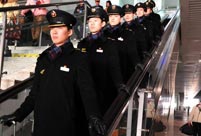 Cockfighting show staged in E. China's Heze during Spring Festival
Cockfighting show staged in E. China's Heze during Spring Festival
 Chinese New Year Flower Fair opens in San Francisco
Chinese New Year Flower Fair opens in San Francisco
 Festivities in Shanghai
Festivities in Shanghai
 PLA navy conducts drill in North China Sea
PLA navy conducts drill in North China Sea
 World's high-tech hotels
World's high-tech hotels
 Li Na poses with trophy on Brighton Beach in Melbourne
Li Na poses with trophy on Brighton Beach in Melbourne
 Six Chinese divers back safely after 300-meter saturation dive
Six Chinese divers back safely after 300-meter saturation dive
 Traditional wedding ceremony of Yao people
Traditional wedding ceremony of Yao people
 Taipei Game Show attracts geeky gamers
Taipei Game Show attracts geeky gamers
BEIJING, Feb. 7 -- One of the trickiest questions asked frequently by political leaders, diplomats and experts around the world in our time is about China's transformation on the global stage and the opportunities and risks associated with this historic process.
At the center of this question is the possible scenarios for the development of the China-U.S. relationship in a deeply intertwined and complicated world.
It has never been easy to manage the relationship of cooperation and competition between the incumbent and rising powers in human history. In the past 100 years, the world has seen two devastating world wars because of a failure to do that.
As China continues to become a global economic and political power in the 21st century, quite a few political leaders and international affairs experts are uneasily drawing historical parallels in the run-up to the First and Second World Wars.
Although these troubling comparisons miss the most striking nature of China's transformation, which is fundamentally peaceful and accommodative, they do say a lot about the underlying worries about the future of China and the world at large.
Against this backdrop, U.S. Senator's confirmation of Max Baucus on Thursday as Washington's new top diplomatic envoy to China is of particular importance both to the two countries and the world.
Baucus, a veteran senator with deep understanding of economic and financial matters, is a well-received candidate for the important post both at home and abroad.
His nomination and confirmation might testify to the U.S. eagerness to tap the huge trade and investment opportunities in China, the fastest growing major economy in the world.
This could be a good sign. China and the United States, as major trade partners, share many crucial economic interests. The more the two countries can benefit from each other's development, the easier to manage their tricky disputes in other areas.
As far as China is concerned, Baucus' career record is somewhat mixed. On one hand, his support for China's entry into the World Trade Organization, which has proven to be one of the most important developments in China's transformation, is well noted in this part of the world.
On the other hand, his support for legislative "punishment" against China for the so-called manipulation of exchange rates also raised eyebrows in the past.
As the new U.S. ambassador to China, Baucus is likely to see the U.S.-China relations in a broader prospective.
Most important of all, he should carry on the good momentum built by Chinese President Xi Jinping and his U.S. counterpart Barack Obama for a new type of major-country relationship that features pragmatic cooperation rather than hostile strategic competition.
To achieve this, Washington and Beijing need more political trust in each other.
The bilateral relationship will be more smooth and fruitful when China does not feel the U.S. threat of containment and when the U.S. finds no ulterior Chinese motive to undermine its global leadership.
By promoting mutual understanding and enhancing economic and strategic cooperation between the U.S. and China, Baucus has the rare opportunity to help write a crucial chapter in international relations and even in the history of mankind.
So far, this historic task seems to have a largely bright future.
 3D film 'The Monkey King' premieres in Beijing
3D film 'The Monkey King' premieres in Beijing  Miss Chinese Int'l Pageant 2014 held in Hong Kong
Miss Chinese Int'l Pageant 2014 held in Hong Kong 'Golden Flowers' in the Spring Festival travel rush
'Golden Flowers' in the Spring Festival travel rush Li Na beats Cibulkova to win Australian Open
Li Na beats Cibulkova to win Australian Open Sexy models at Taipei Game Show 2014
Sexy models at Taipei Game Show 2014 'Living in ice house' competition held in central China
'Living in ice house' competition held in central China  Highlights of Chinese airborne troops'exercises
Highlights of Chinese airborne troops'exercises  All-male high speed train crew during Spring Festival travel rush
All-male high speed train crew during Spring Festival travel rush PLA navy drills in East China Sea
PLA navy drills in East China Sea President Xi visits border troops ahead of Lunar New Year
President Xi visits border troops ahead of Lunar New Year What do Chinese pack in their luggage in Spring Festival Rush?
What do Chinese pack in their luggage in Spring Festival Rush? Blind date fair in Hangzhou of Zhejiang province
Blind date fair in Hangzhou of Zhejiang province Film 'Where Are We Going, Dad' premiered in Beijing
Film 'Where Are We Going, Dad' premiered in Beijing  Australian Open champion Li Na returns to hometown Wuhan
Australian Open champion Li Na returns to hometown Wuhan Twin sisters serve during Spring Festival travel rush for the first time
Twin sisters serve during Spring Festival travel rush for the first timeDay|Week|Month